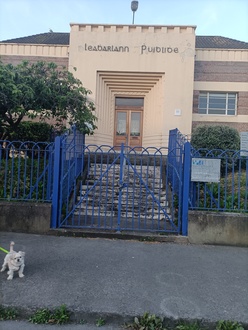- Featured
- Animal Rights
- Anti-racism
- Arts & Culture
- Children
- Climate
- Corporate accountability
- Crime
- Disability rights
- Economic
- Education
- Environment
- Food and Sustainable Production
- Gender Equality
- Governance and Transparency
- Health
- Housing
- LGBT Rights
- Mental health
- Northern Ireland
- Planning
- Privacy and Data Protection
- Rural Inequality
- Social Justice
- Trade
- Transport and Infrastructure
- Workers' Rights
- More
-
Keep AIB cash services in WaterfordThis is impacting on older people's independence and creating barriers such as having to travel to other branches. There's a huge impact to older people as many are not online. This is a big ultimatum to older people and it's taking away their agency and choice to have face to face interaction and support for cash services. Many older people would have safety and security concerns and others use banks as opportunity for social interaction. The bank is saying the post office is an alternative but in recent years many post offices have been closed in rural Ireland thus providing no choice now for customers in these areas with these bank service changes. Many post offices may not structurally have the capacity for large groups of people which may create large queues. This decision by AIB will also impact greatly on local businesses and communities in these areas. Many older people have been loyal customers for decades and their money has helped pay for those branches and services. This is being very disrespectful to them by not having these services available to them anymore. Many older people and people of all ages may have accessibility requirements around branches and travelling to them ie. sight impairments or/and physical disability. It's really important to remember that the Irish tax payer bailed out this bank and others during the 2008 financial crash . We own over 60% stake in AIB and there has been arbitrarily no consultation with us about this. I am calling on AIB Bank to reverse its decision to rollback cash services in AIB bank branches in Waterford (Ardkeen, Tramore and Lismore). Read more here: https://twitter.com/BPhillipsWriter/status/1549512192952762368175 of 200 SignaturesCreated by Bernadette Phillips
-
Keep Cobh AIB a full service branchTo keep banking accessible to all, normal services also digital, this is very important.314 of 400 SignaturesCreated by Vivienne Farrell
-
Introduce a statutory maximum working temperatureHot weather can make work unbearable and with record temperatures likely to be a trend in Ireland, we should introduce a statutory maximum working temperature after which employees are sent home.11 of 100 SignaturesCreated by Harvey McDermott
-
Save Coolroe Meadows RoundaboutDont allow increased traffic and increased speed through Coolroe Meadows/Greenfields Estate. Say NO to removal of pedestrian crossing and splitting estate in two.114 of 200 SignaturesCreated by John M Daly
-
Inchicore Library Community SpaceOur mental health is suffering for the lack of public community space. We have lost so much with the closing - Children's Saturday morning story time, The stitch n bitch, Film club, book club. Cathy Suffel the historian in residence talks, the fact that one never knows who is alive or dead because of the lack of community space145 of 200 SignaturesCreated by Teresa O’Maille
-
#Gaffs4AllThe government called its latest plan Housing for All but as with previous housing plans, it hasn’t delivered. Rents and house prices continue to rise exponentially, social and affordable housing delivery is behind targets, homelessness has also increased. The housing crisis is scarring a generation. For renters, it is beyond a cost of living crisis – it is a cost of survival crisis. We need a new vision and a new housing plan. We need Gaffs for All: delivering affordable, decent, green, forever homes. The housing crisis can be solved with the right policies and real action and funding in housing. We need a new housing plan and real solutions that will actually work to deliver affordable green homes for all – not half-baked solutions that will leave us with a permanent crisis and merely benefit the property industry and investor funds as the current housing plan does. Please sign this petition calling on the Government to implement the following ten key policies. After you have signed, share it on social media, with #gaffs4all and #right2housing Lets solve this housing crisis together!1,633 of 2,000 SignaturesCreated by Rory Hearne
-
CARE NOT PRISON: Release of Caitlin Corcoran and all charges against her dropped!On the day of the tragedy, during an examination by a doctor, Caitlin went into a bathroom and spent 13 minutes giving birth without telling anybody, an unimaginably traumatic event. Caitlin is currently suffering from depression and post traumatic symptoms, yet the trial showed little concern for her physical and mental wellbeing. It is concerning that the DPP would criminalise a young woman who gave birth in shock. This breaks will previous compassionate views in similar cases, the Gardaí always appealed for women to come forward and they would be treated with compassion and privacy, alas, this wasn't to be for Caitlin. What is not on trial is how Caitlin is a victim of domestic abuse. During her trial she spoke of being beaten and punched by her father and bullied at school. Caitlin, is a survivor of bullying and abuse, and will not likely see justice for the harm that was done to her.133 of 200 SignaturesCreated by Tracey Nutterfield

-
Save the MangalaOur beloved Mangala is a unique area of woodland in the heart of Douglas. It's an area of natural beauty and is full of biodiversity including many protected species. The destruction of natural habitats and mature woodland is not acceptable. The Mangala is also of huge historical importance because of its close connection with Morough Mills. The Mangolds, locally called Mangles, that gave it its name were grown there to be used in the mills. The woods is a haven that generations of us have enjoyed and continue to do so. The people of Douglas won't stand for this. We won't allow the destruction of OUR Mangala3,122 of 4,000 SignaturesCreated by Nina O'Neill
-
Free IT courses for children in IrelandFor many parents with a fear of gadgets, programming courses are a lifesaver. The child is already addicted to computer games and it's hard to distract them, so let them do something useful, they say. This is the most popular request when starting school. Another popular option: parents understand the prospects of IT-sphere and send their children to learn demanded skills for high-paying professions. Children in general find learning programming from scratch much easier than adults without IT experience. In third place is the desire of children who are interested in IT. Parents support this interest and buy courses. Learning to program is above all a great way to develop logical and analytical thinking. When writing code, the programmer goes to the goal, speaks the same language as the computer and will only be understood if the code is logically constructed. If two lines are mixed up, the program or game will not work. Analytical thinking, planning, and planning come into play. Design thinking works too. The courses are designed with a practical approach in mind, students can practice what they have learned in their projects without using ready-made templates. A clear sequence of actions, decomposition of tasks and tracking their implementation are important for success. If, when creating a game, a child spends all his or her time on elaborating one character, the game will not happen. You will get one character without a game world. Therefore, students develop soft skills and time-management skills at the same time.12 of 100 SignaturesCreated by Markus Doronin
-
Call for stricter rules on harmful acts and misinformation on social media sitesMisinformation is a deadly pandemic on social media sites. One particular concern of mine is the spread of fake ‘life hacks’ videos. This might seem harmless until you look at the types of videos being posted up. One video I saw that was actually on YouTube’s Facebook page was telling people how to make sausages in the toaster using tinfoil. Putting tinfoil into toasters is strongly discouraged from most toaster manufacturers because it could cause electrocution and even fire. Another video I saw on Instagram encouraged people to use a transformer from a microwave to burn a design into wood. This is remarkably dangerous because one single mistake could cause an electrical current of 2,000 volts to enter your body, which is 10 times the amount of power needed to stop your heartbeat. There have been at least 34 reported deaths from this ‘life hack’. Four of them were qualified electricians and the majority of them were wearing proper gloves and P.P.E. However, despite this, these videos rarely suffer any sort of sanctions from the website. One site that promotes these kinds of life hacks is ‘5 Minute Crafts’. This channel is currently the 11th most subscribed YouTube channel with over 70 million subscribers. They often put up fake and sometimes ‘life hack’ videos and they often get millions of views. I think this is unacceptable and we as a country have the power to put immense pressure on these companies because there are multiple users and both Meta and Google have offices in Dublin.8 of 100 SignaturesCreated by Seán Keeney
-
Open up Digital Radio in IrelandAs the world goes digital for all types of audio and visual entertainment, Ireland is going in the opposite direction. Radio in Ireland is stale - dominated by just a few media groups, most of which play the same music over and over again. DAB Radio stands for Digital Audio Broadcasting and can offer much more choice for the radio listener. Imagine having multiple non stop music stations of every conceivable genre? The Broadcasting Authority of Ireland (BAI) is the body responsible for regulating radio in Ireland, however no new licenses have been issued in the last decade. When it comes to Digital Audio Broadcasting, provision has been made in section 131 parts i and ii of the Broadcasting Act 2009 to open up Ireland to Digital Radio, however in over 13 years the above Commission has sat on its laurels and failed to realise the provisions of this act. If you have come to this petition, it is most likely because you have been listening to a DAB service in Ireland which has been set up to demonstrate what could be, if our regulators embraced this technology (like most other countries in Europe) The EU have allocated 36 frequencies in the VHF band exclusively for use by Digital Audio Broadcasters - each one of these frequencies capable of broadcasting over 20 digital music services each – if we do the maths, that’s a lot of potential services available. It is now an EU requirement for every new car to have a DAB tuner on its entertainment system. on average 120,000 new vehicles are sold in Ireland each year, it will also be a requirement soon that any "portable radio" sold must also include the DAB band to receive Digital radio. In Ireland this frequency band is completely unused. When any enterprising entrepreneurs take it upon themselves to demonstrate what could be, swift action is taken by the regulators to close these services down. Ireland needs the restrictive rules around broadcasting removed. Imagine only one takeaway, or one car retailer being allowed in each town or even each county? !! well that's the way it is with radio. The BAI needs to fully embrace DIGITAL radio and to remove, completely amend or rework the existing Broadcasting Act 2009, which combined with the Wireless Telegraphy Act 1926 and 1988 completely stymies any third party from entering the radio market. This makes the overall radio experience of Irish people much poorer than their EU or UK counterparts. DAB radio is also extremely environmentally friendly - 20 stations could potentially use the same amount of electricity as just one FM service. Three of these DAB frequencies could be used to transmit every station currently on FM across the entire country. About 40 transmitting sites would be needed to provide almost national coverage. Those sites are already being used for FM. The National stations from RTE, Today FM and Newtalk currently use 6 analogue frequencies on each site. Add into the mix the local and community stations, and in many parts of the country this exceeds 10 analogue frequencies. All these could be condensed into just 3 national DAB Multiplexes. Imagine being able to select the local radio station for Kerry while on holiday or business in Donegal without the need to use mobile data and a clunky app, or being able to tune into a Monaghan local GAA match while in Cork on the Monaghan local station. With Digital radio this is all possible. Add another 3 multiplexes into the mix and we could have 60 national non stop stations bring you every conceivable music format. DAB can also be used on a local basis. In the UK this is called small scale DAB. County multiplexes could contain numerous versions of the very successful community services, local sports events, religious services and live local government broadcasts.188 of 200 SignaturesCreated by Brian Johnston
-
Stop animal crueltyThis is important because no animal deserves to live in cruel conditions they need to have a happy and healthy life23 of 100 SignaturesCreated by Dervla Hogan






.jpg)





